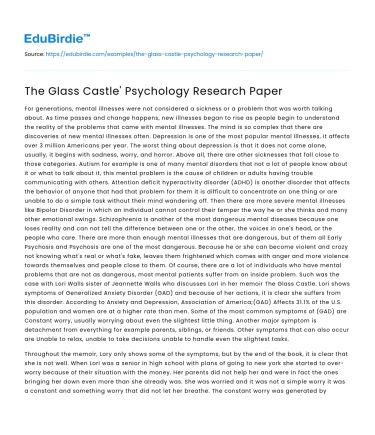Introduction
"The Glass Castle," a memoir by Jeannette Walls, offers a compelling narrative that provides profound insights into the complexities of family dynamics and individual psychology. This narrative explores the intricate psychological interplay between personal resilience and familial dysfunction. The memoir depicts Walls' tumultuous upbringing marked by poverty, neglect, and the erratic behavior of her parents. These elements serve as a fertile ground for psychological analysis, particularly concerning the development of resilience, coping mechanisms, and the impact of adverse childhood experiences. This essay aims to dissect the psychological themes presented in "The Glass Castle," examine the resilience displayed by Walls and her siblings, and explore the long-lasting psychological effects of their upbringing. By delving into these aspects, this paper seeks to understand how adverse childhood experiences shape psychological development and resilience in adulthood.
Resilience in the Face of Adversity
Resilience, defined as the ability to bounce back from adversity, plays a pivotal role in "The Glass Castle." Jeannette Walls and her siblings are forced to navigate a challenging environment characterized by instability and neglect. Despite these adversities, Walls demonstrates remarkable resilience, which is a central theme of her memoir. According to Masten and Reed (2002), resilience is not an extraordinary trait but rather a common response to adversity, which is evident in Walls' life.
Save your time!
We can take care of your essay
- Proper editing and formatting
- Free revision, title page, and bibliography
- Flexible prices and money-back guarantee
Walls' ability to adapt and thrive despite her circumstances can be attributed to several psychological factors. Firstly, her intrinsic motivation for self-improvement and education acts as a buffer against her tumultuous environment. This aligns with the theory of self-determination, which emphasizes the role of intrinsic motivation in fostering resilience (Ryan & Deci, 2000). Additionally, Walls' ability to find meaning in her struggles, a concept rooted in Viktor Frankl's existential psychology, further supports her resilient nature. Frankl (1963) posits that finding meaning in suffering can transform adversity into a source of personal growth.
While Walls' resilience is commendable, it is essential to address potential counterarguments. Critics might argue that Walls' resilience is an exception rather than the norm, given the severe nature of her circumstances. However, research indicates that resilience is a dynamic process influenced by both individual and environmental factors (Luthar, Cicchetti, & Becker, 2000). This suggests that while Walls' resilience is exceptional, it is not unattainable for others in similar situations.
The Role of Parental Influence
Parental influence is a critical factor in shaping children's psychological development, and "The Glass Castle" provides a stark illustration of this concept. Rex and Rose Mary Walls, Jeannette's parents, exhibit behaviors that oscillate between neglect and unconventional nurturing. This duality significantly impacts the psychological development of their children, as parental behavior is a primary determinant of attachment styles and future relational patterns (Bowlby, 1988).
Rex Walls, with his charm and grandiose plans, instills a sense of adventure and creativity in his children. However, his chronic alcoholism and inability to provide stability lead to emotional and physical neglect. This inconsistency aligns with the concept of disorganized attachment, which is characterized by a lack of coherent strategies for dealing with stress (Main & Solomon, 1990). Such attachment patterns can lead to difficulties in forming stable relationships in adulthood.
Conversely, Rose Mary's artistic inclinations and aversion to traditional responsibilities expose her children to a world of creativity but also to neglect. Her behavior exemplifies permissive parenting, which can result in a lack of structure and boundaries for children (Baumrind, 1966). Despite these challenges, Walls and her siblings display remarkable adaptability, suggesting that other protective factors, such as social support and personal agency, may mitigate the negative effects of their parents' behavior.
Long-Term Psychological Impacts
The long-term psychological effects of the Walls' upbringing are complex and multifaceted. Adverse childhood experiences (ACEs), such as those depicted in "The Glass Castle," have been linked to a range of negative outcomes, including mental health disorders and substance abuse (Felitti et al., 1998). However, Walls' narrative demonstrates that not all individuals exposed to ACEs experience these adverse outcomes.
Jeannette Walls' ability to transcend her challenging past is indicative of post-traumatic growth, a phenomenon where individuals undergo positive psychological change following adversity (Tedeschi & Calhoun, 1996). Walls' success as a writer and her ability to maintain meaningful relationships suggest that she has harnessed her experiences to foster personal growth and resilience.
It is essential to consider the role of social support and personal agency in mitigating the long-term effects of ACEs. Walls' determination to forge a better life for herself, coupled with the support of her siblings, plays a crucial role in her ability to overcome her past. This underscores the importance of protective factors in promoting resilience and psychological well-being in individuals exposed to adversity.
Conclusion
"The Glass Castle" offers a poignant exploration of the psychological underpinnings of resilience, parental influence, and the long-term effects of adverse childhood experiences. Jeannette Walls' narrative is a testament to the human capacity for resilience and growth, despite significant challenges. The memoir underscores the importance of understanding the dynamic interplay between individual and environmental factors in shaping psychological development. While Walls' story highlights the potential for resilience and post-traumatic growth, it also serves as a reminder of the critical role that supportive relationships and personal agency play in overcoming adversity. By examining these themes, this essay contributes to a deeper understanding of the psychological dynamics at play in "The Glass Castle" and their broader implications for individuals facing similar circumstances.






 Stuck on your essay?
Stuck on your essay?

